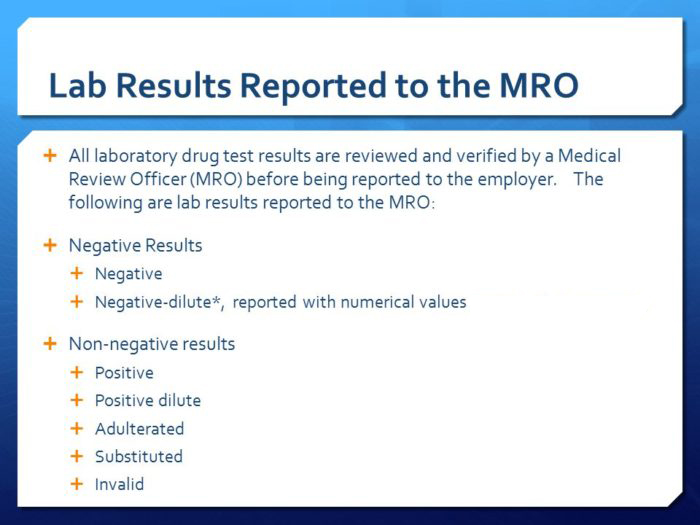Definitions

Drug Testing Definitions
NEGATIVE
The result reported by an HHS-certified laboratory to an MRO when a specimen contains no drug or the concentration of the drug is less than the cut-off concentration for the drug or drug class and the specimen is a valid specimen.
POSITIVE
The result reported by an HHS-certified laboratory when a specimen contains a drug or drug metabolite equal to or greater than the cut-off concentrations.
RECONFIRMED
The result reported for a split specimen when the second laboratory is able to corroborate the original result reported for the primary specimen.
REJECTED FOR TESTING
The result reported by an HHS-certified laboratory when a specimen contains a drug or drug metabolite equal to or greater than the cut-off concentrations.
SPLIT SPECIMEN COLLECTION
In drug testing, a part of the urine specimen is sent to a first laboratory and retained unopened, and which is transported to a second laboratory in the event the donor requests it be tested following a verified positive test of the primary specimen or a verified adulterated or substituted test result.
SET ASIDE
This test which is cancelled by the Medical Review Officer allows the company policy to determine if another test should be conducted. Generally, this result is reported in certain circumstances when the MRO cannot report a definitive result. This could be a result of, but not limited to: Low-grade morphine with the denial of donor of use. Low-grade morphine or codeine where the donor is not available for interview.
DILUTE SPECIMEN
The laboratory reports the vast majority of dilute specimens as negative. They report this way because the dilute range is not outside the limits of normal human urine but may be slightly below the normal range due to intake of liquids or other normal activities. The MRO will generally report these as negative with the creatinine levels on the result. Low creatinine, PH, and/or specific gravity on a confirmed positive result will not affect the MRO process.
CANCELED
Indicates that the testing process was not completed. Various reasons such as mismatched identification numbers or insufficient urine will cause a test to be canceled by both the laboratory and the Medical Review Officer.
ADULTERATED SPECIMEN
A specimen that has been altered, as evidenced by test results showing either a substance that is not a normal constituent for that type of specimen or showing an abnormal concentration of an endogenous substance.
CONFIRMATORY DRUG TEST
A second analytical procedure performed on a different aliquot of the original specimen to identify and quantify the presence of a specific drug or drug metabolite.
INITIAL DRUG TEST AKA SCREENING DRUG TEST
The test used to differentiate a negative specimen from one that requires further testing for drugs or drug metabolites.
INITIAL SPECIMEN VALIDITY TEST
The first test used to determine if a urine specimen is adulterated, diluted, substituted, or invalid.
LABORATORY
Any U.S. laboratory certified by HHS under the National Laboratory Certification Program as meeting the minimum standards of Subpart C of the HHS mandatory Guidelines for Federal Workplace Drug Testing Programs; or, in the case of foreign laboratories a laboratory approved for participation by DOT under this part.
LIMIT OF DETECTION (LOD)
The lowest concentration at which a measurant can be identified, but (for quantitative assays) the concentration cannot be accurately calculated.
LIMIT OF QUANTITATION
For quantitative assays, the lowest concentration at which the identity and concentration of the measure and can be accurately established.
